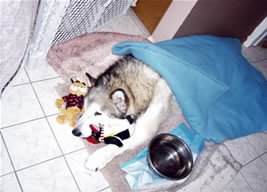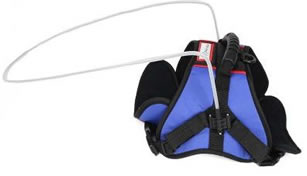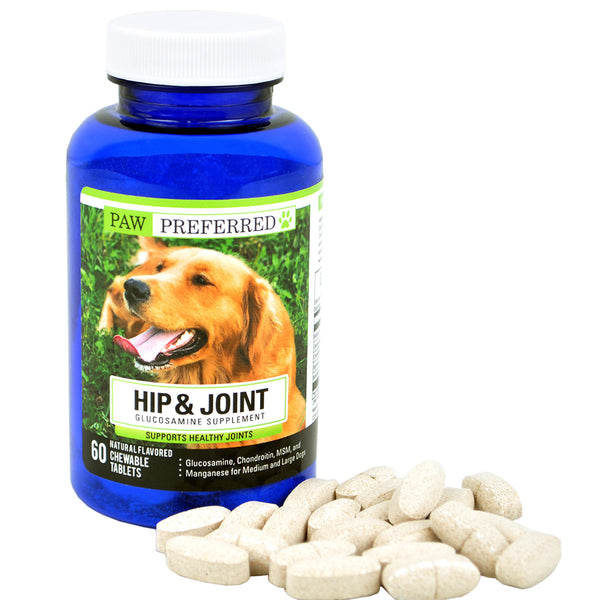Mobility Impaired & Incontinent Malamutes 
Malamutes are a very proud and stubborn dog and dislike being ill or dependent. Should one become handicapped your largest problem (particularly if you have other dogs) is the pack mentality of "kill the weak one". If your dog is well liked within the pack, this shouldn't be a problem - but if he was a trouble maker, or particularly submissive to more dominant dogs, it just may make it easier for the others to "clean house". It's your job to protect your ill or handicapped Malamute during recovery and of course after. Many Malamutes do just fine with the proper equipment to assist in lifting and moving. Because Malamutes are a large dog, the biggest problem seems to be what to do when they become immobile.
There are several options. The most common one when people think they have no options is to put the dog down. I don't recommend this since a handicapped dog can live a quite full and fulfilling life! Obtaining slings and lifts, or even a wheelchair to assist with mobility can give you several more years with a beloved Malamute. One of the happiest times in Hoover's life was when we took him (along with several other dogs) on "vacation" up north to scout property and go to a dog show. At the time his rear was quite weak and he required assistance to walk. I wish I had video of him attempting to run in the sand dunes with me trying to keep up holding up his butt! I bet I looked pretty silly, but he enjoyed himself completely.
A malamute is a very self-sufficient dog and may at first resist your help - but once they realize they have greater mobility (and more fun) with a cart, sling and assistance, most will go along with the program. One of my biggest fears was that Shadow who had been aggressive most of his life, would become more so when his rear gave out in old age - not the case! Like most malamutes, he made a gargantuan effort to "help" when I lifted and did his best to not have accidents as he became more incontinent. Malamutes will go the extra mile to not appear "weak" and if an orthotic or brace helps them, why not? I wish at the time I'd known about some of these products - it would have made it a lot easier to care for my older dogs that slowly lost the use of their rear ends, or became incontinent, or for dogs that suffered injuries or joint problems. Vets rarely tell you that orthotic appliances are available to dogs that lose limbs or need support (even temporarily) for slipped patellas, hips, and hock joints. Often with temporary support they can regain full use of the affected joint because it can heal without additional injury. Orthotics also can allow your dog on required "crate rest" to do mild exercise without further injuring himself. There are many kinds of orthotics that allows joints to bend and strengthen while healing. They help avoid loss of muscle mass during recovery and are lined with a foam padding to provide maximum skin protection from irritation or abrasions while allowing the dog to perform many of his normal activities. Other kinds of braces allow partial immobilization to reduce pain induced. Injuries to the lower limbs of dogs frequently need to be splinted or braced. The Leg Splints are modeled after human splints for lower leg, ankle and foot injuries.
Prosthetics allow dogs who have had their limbs amputated (from cancer or other causes) to regain mobility. They can also be used for certain congenital defects.
I spent a long time finding a reliable distributor of good orthotics and have the links below. One of my favorite products is the full-body suit which would be perfect for dogs suffering from severe coat funk. Coat funk leaves the dog hairless in patches and vulnerable to severe weather. Another item that is wonderful is the drag-bag. This is great for dogs that don't want to use a wheelchair - or for active dogs to use when they are out of their wheelchairs. It prevents raw spots on skin when the dog scoots around and can be fitted with a diaper for incontinent dogs - protecting both the dog and floors.
With a little assistance, your handicapped Malamute can live out his years and not be the burden he doesn't want to be - and you can enjoy the best years of his life (because he's finally not chewing everything in sight, getting on counters and raiding the trash!)
















